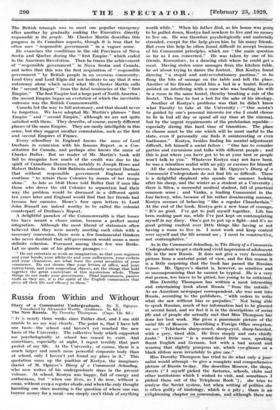Empire and Commonwealth
Empire and Commonwealth. By Chester Martin. (Clarendon Press. 21s.) MR. CHESTER MARTIN, Head of the Department of History in the University of Manitoba, has given us in this book a valuable study of the development of Canada from the old Imperialism along the road of responsible government to membership of the British Commonwealth which is composed of equal self-governing nations. It is a marvellous story. And its familiarity need not make us forget that every British subject has a right to be proud of an achievement which has not been matched by any, other people.
The difference between the American achievement, great though it has been, and the British achievement is that America has stereotyped her democracy by enshrining it in an almost immutable written Constitution. She put democracy, as democracy was conceived by English-speaking people at the end of the eighteenth century, into a cold chamber. There it has been marvellously preserved. But it stands for representative government, not for responsible government.
The British triumph was to meet one popular emergency after another by gradually making the Executive directly responsible to the people. Mr. Chester Martin describes this progress in its Canadian aspects, though it is true that he often uses " responsible government " in a vaguer sense.
He examines the conditions in the old Provinces of Nova Scotia and Quebec during the " first Empire " which ended in the American Revolution. Then he traces the achievement of "responsible government" in Nova Scotia and Canada, and notes that this was the first acquisition of " responsible government " by British people in an overseas community. Lord Grey and Lord Elgin did not hesitate to say that it was autonomy alone 14 hich saved what Mr. Chester Martin calls the " second Empire " from the fatal tendencies of the " first Empire." The first Empire lost a large part of North America ; the second Empire began an evolution of which the inevitable outcome was the British Commonwealth.
Canada led the way to full autonomy, and that should never be forgotten. We have adopted Mr. Martin's phrases " first Empire " and " second Empire," although we are not quite satisfied with them. They describe, of course, merely different phases of the same Empire. They are easily intelligible in this sense, but they suggest another connotation, such as the first and second Empires of France.
Every schoolboy in England knows the same of Lord Durham in connexion with his famous Report in a Con- stitution for Canada, and perhaps also knows the name of Charles Buller. But no reader of Mr. Martin's book will fail to recognize how much of the credit was due to the spirit of Canadians themselves, notably to Joseph Howe and Robert Baldwin. In 1838 Baldwin solemnly warned Durham that without responsible government England would continue " to retain these Colonies by means of her troops alone." As late as 1846 Howe told Buller that if men like those who drove the old Colonies to separation had their way the problem would be discussed in a different spirit ten years later and England would find that her friends had become her enemies. Howe's four open letters to Lord John Russell are indeed worthy to be called the colonial counterpart of Durham's Report.
A delightful paradox of the Commonwealth is that looser ties have meant a closer union, because a perfect moral integration. Although the most liberal of statesmen often believed that they were merely meeting each crisis with a necessary concession, there were a few fundamental thinkers who never doubted that self-government would mean a more definite cohesion. Foremost among these few was Burke. Let us quote one of his glorious passages :-
" Do not entertain so weak an imagination, as that your registers and your bonds, your affidavits and your sufferances, your cockets and your clearances, are what form the areal securities of your commerce. Do not dream that your letters of office, and your instructions, and your suspending clauses, are the things that hold together the great contexture of this mysterious whole. These things do not make your government. Dead instruments, passive tools as they are, it is the spirit of the English communion that gives all their life and efficacy to them."



















































 Previous page
Previous page